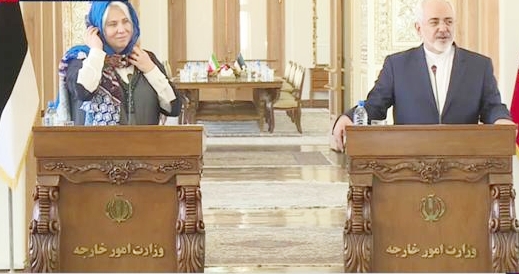Zarif made the remark in a joint press conference with his Estonian counterpart, Marina Kaljurand, in Tehran on Sunday.
The Iranian top diplomat stressed that the US Secretary of State John Kerry knows well that Iran’s missile capabilities are not open to negotiations.
“If the US administration is really serious about defense issues, it should decrease the sale of weapons, which are killing innocent Yemeni people every day, and should stop [the sale of] weapons which, as admitted by the Zionist regime, are used to attack civilians,” Zarif said.
He added that the US government knows well that Iran’s defense issues are not negotiable and that no deal would be made on such issues.
Zarif emphasized that the issue of Iran’s defense programs have been clearly excluded from the nuclear agreement, known as the Joint Comprehensive Plan of Action (JCPOA), reached between Iran and the P5+1 group of countries on July 14, 2015.
“There would be no JCPOA for defense issues,” Zarif emphasized.
Zarif’s reaction came after the US Secretary of State John Kerry suggested on Thursday that Washington was open to a “new arrangement” with Tehran for peacefully resolving disputes such as its recent ballistic missile tests.
Kerry said the US and its partners were telling Iran that they were “prepared to work on a new arrangement to find a peaceful solution to these issues.”
The Islamic Revolution Guards Corps (IRGC) successfully test-fired two ballistic missiles on March 9 as part of military drills to assess its capabilities. The missiles dubbed Qadr-H and Qadr-F were fired during large-scale drills code-named Eqtedar-e-Velayat.
On March 8, Iran fired another ballistic missile called Qiam from silo-based launchers in different locations across the country.
The US claims that Iran’s missile tests violate the UN Security Council Resolution 2231 that endorsed the JCPOA.
Iran, however, has repeatedly announced that the missile launches are not against the Security Council resolution.
US occupation of Iraq, root cause of terrorism in ME
The Iranian foreign minister also dismissed Kerry’s “baseless” allegations that Tehran is destabilizing the Middle East.
“The risk of terrorism and extremism, which is the main risk threatening the region, is the result of the United States of America’s occupation of Iraq and is a risk that we had predicted before the US attack on Iraq and had officially announced that the occupation of Iraq would lead to extremism and terrorism in the region,” Zarif said.
He warned that the threat of terrorist and extremist groups such as Daesh is spreading in the region by those who only think about their short-term interests and are not concerned about their own long-term security.
Instead of making unfounded accusations against Iran, the US is needed to adopt a more serious approach to regional issues, he said.
The US secretary of state on Thursday accused Iran of conducting “destabilizing actions” in the Middle East.
Speaking in a joint press conference with Bahraini Foreign Minister Sheikh Khalid bin Ahmed Al Khalifa, Kerry said the US calls on Iran to “constructively join in the efforts to make peace … and to work toward a cessation of hostilities.”
